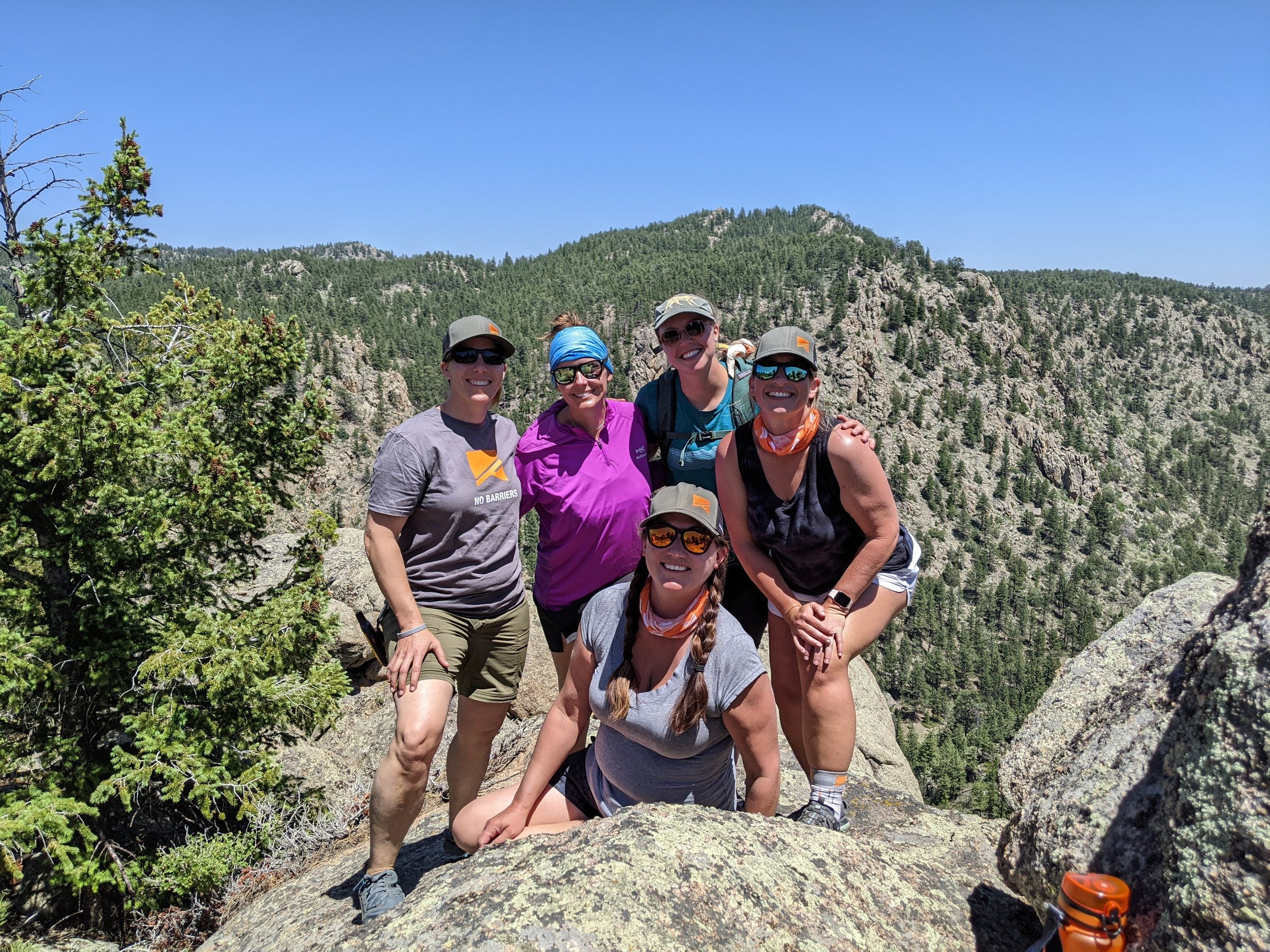Adventure Cures
In a literal sense, Audrey G.’s insatiable craving for adventure has saved lives and helped to mend hearts. Her need to adventure more and to go farther through along Rocky Mountain trails was responsible for sustaining her brother and her family through one of the most brutal moments of their lives.
Seven months before her twin brother Cory's accident and subsequent spinal cord injury, Audrey found herself in a NOLS (National Outdoor Leadership School) Wilderness First Aid training course thinking, “When will I ever use this?”
She and her mom had planned and executed backpacking trips as often as possible in subsequent years - rim to rim to rim in the Grand Canyon; the John Muir Trail; and weekend to two-week trips in the Sierra Nevada mountains. Needless to say, 911 hadn’t always been an option. Packing her mom on her back across rivers and treating her intolerable blisters after a long day’s hike on a few of those trips made Audrey realize that her medical training could use some refining if she and her mom wanted to continue.
So, they dove in. During their weekend of NOLS Wilderness First Aid training through REI, Audrey played the point person in varying scenarios, helped everyone remain calm, and learned how to care for herself so that she could care for the injured sufficiently.
Then, seven months later, in June of 2019, it happened. At an annual family camping trip on the Colorado River, after 20-30 of Audrey’s family members had been swimming, jumping and diving into the river throughout the weekend, Cory’s final dive took him to the bottom far too soon.
“At first, I had no idea what was going on,” Audrey said. She assumed the screams and cries of family members were for the fallen wakeboarder upriver.
When she saw a family member carrying Cory out of the water, blood dripping from his head, his body limp, she panicked.
“It all happened so quickly. I’m not sure how I calmed myself, but I knew my composure was crucial for my brother’s care,” Audrey wrote in a NOLS blog in 2019, shortly after the accident.
“During the NOLS course, I was chosen to stabilize the neck and head, lifting the patient for the spinal injury scenario. Now, I did just that in real life, as if it were muscle memory,” Audrey continued.
Cory’s first words when family members carried him out of the water were “Thank you.” Then, from the dock to the helicopter and en route to the hospital, he kept repeating, “I’m sorry, I’m so sorry.”
Audrey sat by his side, stabilizing his neck and spine until the paramedics arrived to transport Cory by helicopter. Two hours later, she met him at the Palm Desert trauma center where he uttered the last words he would speak for four weeks: “I love you.”
Life as They Knew It
Cory’s injury was severe. He had fractured every cervical vertebrae. Following surgery to fuse his neck at the base of his skull to T1, Cory was declared quadriplegic with slight arm movement but no hand or leg movement.
Audrey, never one to shy away from a challenge and with a heart full of love for her twin brother, decided to take on the role of Cory’s full-time caregiver. She would be his person, his everything.
A lifelong adventurer and triathlete, Audrey had signed up for her third half-ironman race months before the accident.
“This saved me,” Audrey said. During Cory’s three-month stay at Craig Hospital, a neurorehabilitation and research center in Englewood, CO, Audrey found solace and an outlet in her daily two-hour early morning workouts.
“Adventure and being outdoors fills my bucket,” she said.
The overwhelming roller coaster of emotions that would come when caring for Cory once they arrived home was a new kind of adventure that Audrey wasn’t accustomed to.
“The anger and subsequent guilt that you feel isn’t something you can prepare for. And, no one can really relate to those feelings, except other caregivers.”
Cory, known for his light-hearted, easy-going personality, rolled with this hardship and new challenge as he did with all hurdles in his life. So, the rage and frustration that Audrey experienced made her feel ashamed and uncomfortable. She eventually felt trapped in it and knew that she had to find an outlet…soon.
A Brutally Beautiful Retreat
While at Craig Hospital, Audrey met Heather Zoccali, founder of The Arch Foundation, a family caregiver support organization, and later founder of the No Barriers and Brutally Beautiful Caregivers Program and felt an instant kinship. The program promised adventure, connection, all of which Audrey felt she desperately needed. When she returned home, she immediately signed up for the caregivers retreat at the Sky Corral Ranch in Bellvue, CO, promising hiking, whitewater rafting and tech-free time in the outdoors. She felt confident that a little adventure would help her shake these feelings off.
And, for reasons Audrey didn’t anticipate, the retreat, indeed, changed everything.
“In the very first circle up, I felt that everyone was finally speaking my language. They all understood where I was coming from. They all shared the same feelings,” she said.
In group discussions, caregivers explored what they wanted in life and who they were at their core.
“It really forced me to take a deep, hard look at myself. It reignited a fire I felt I had lost,” Audrey said.
The whitewater rafting, jeep tour, silent hikes, and the intense connection with other caregivers which is masterfully and organically intertwined in each activity was intoxicating. Shortly after her first retreat, Audrey signed up to become a program guide.
“Everytime, every single time is the most amazing time of my life. Witnessing myself and other caregivers transition and transform is the most fulfilling experience.”



